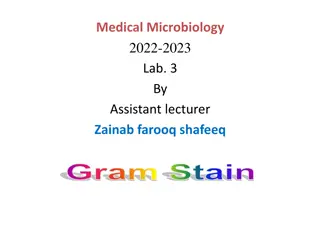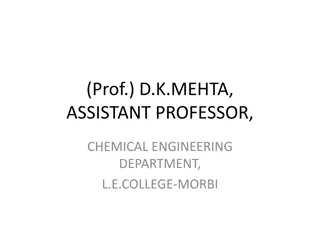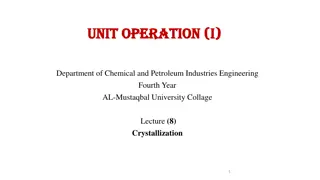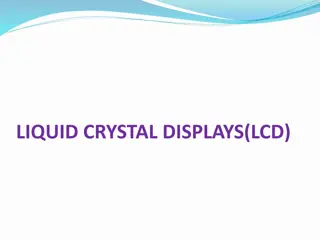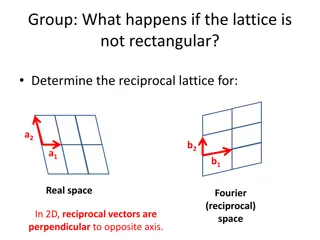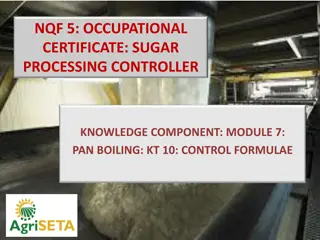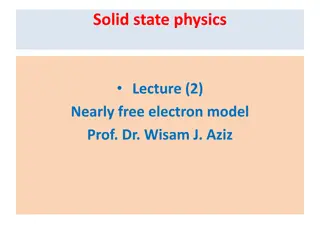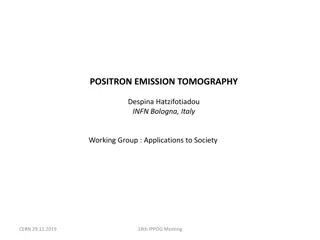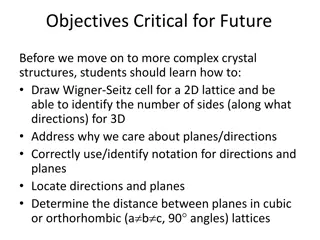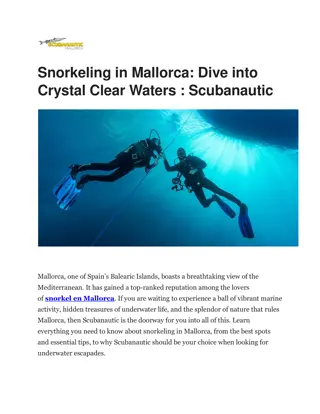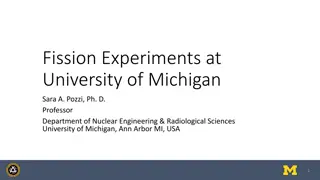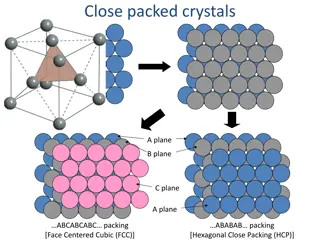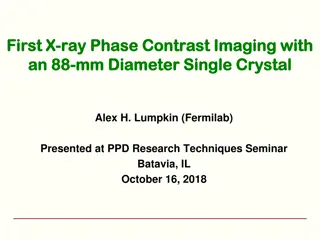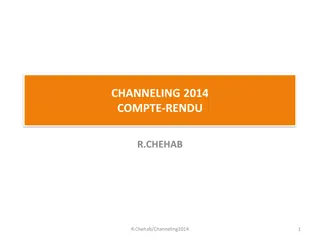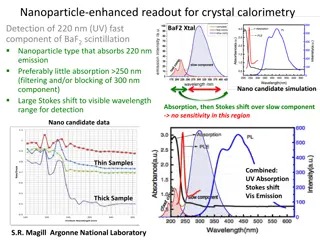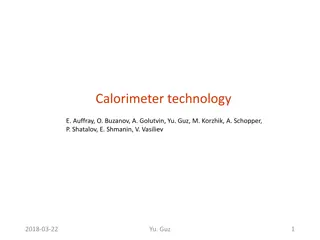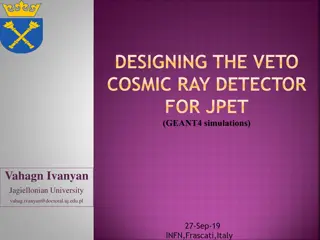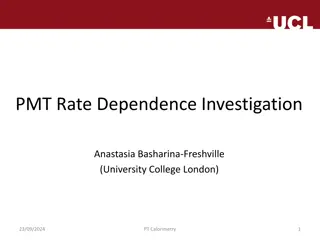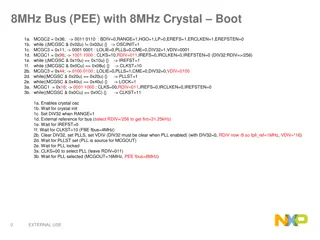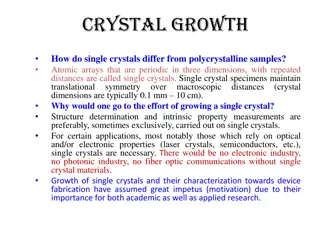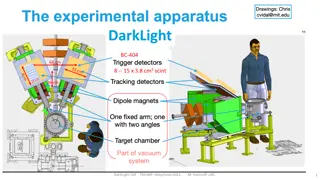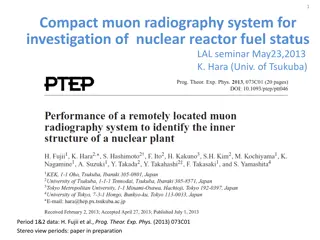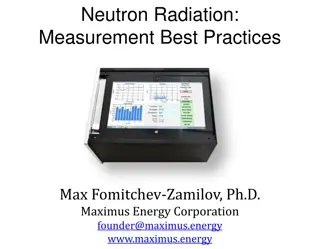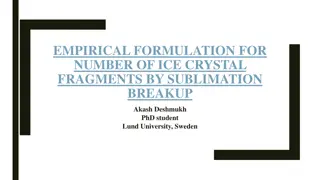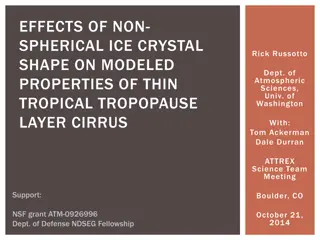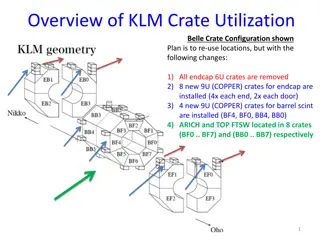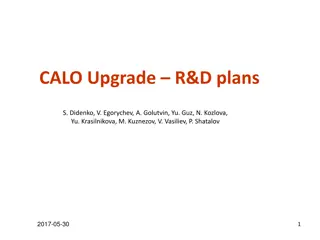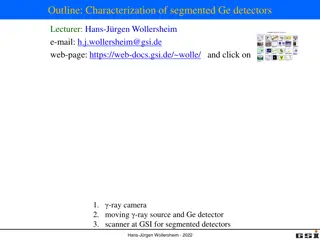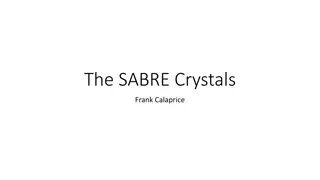Advancements in Crystal Technology for Replacement of Electrostatic Septa
Crystal technology is being explored as a replacement for electrostatic septa in particle accelerators like the SPS at CERN. The transition aims to improve beam extraction efficiency and reduce radiation levels, impacting personnel safety and equipment lifespan. Various parameters and performance re
1 views • 17 slides
Crystal Field Theory in Transition Metal Complexes
Crystal Field Theory (CFT) explains the colors and magnetic properties of transition metal complexes. It focuses on the energy changes in d-orbitals of metal ions caused by surrounding ligands. This theory, developed in 1929, provides insights into the bonding interactions in complex compounds. The
10 views • 44 slides
Evolution of Liquid Crystal Display (LCD) Technology & Applications
Liquid crystal displays (LCDs) have evolved from small screens in calculators to large, high-definition flat-panel TVs. LCD technology, discovered accidentally in 1888, utilizes liquid crystals that align to display images. Common LC phases include nematic, characterized by thread-like defects. LCDs
5 views • 44 slides
Understanding Crystal Structures and Types of Solids in Materials Science
Crystal structures in materials science involve the arrangement of atoms in solids, with examples of crystalline and amorphous solids like metals and glass. Explore concepts like energy packing, definitions of crystalline materials, unit cells, BCC and FCC lattices, HCP structures, and Miller Indice
10 views • 12 slides
Crystal Meth For Sale Online
Looking to buy crystal meth online? Find top-quality crystal meth for sale in Australia. Discover where you can buy crystal meth safely and securely from trusted sources today.
1 views • 1 slides
Understanding the Gram Stain Technique in Medical Microbiology Lab
The Gram stain is a crucial technique in bacteriology, dividing bacteria into Gram-positive and Gram-negative groups based on cell wall characteristics. This method involves using crystal violet, iodine, ethanol, and safranin to differentiate between the two types of bacteria. Gram-positive bacteria
0 views • 11 slides
Crystallization Principles in Chemical Engineering: Understanding Crystal Formation and Purification Methods
Crystallization is a key process in chemical engineering, involving the formation of solid particles within a homogeneous phase to obtain pure chemical substances. This article discusses the principles of crystallization, the importance of crystal size control, equilibria in the process, and the con
1 views • 40 slides
Crystallization Process in Chemical and Petroleum Industries
Crystallization is a purification method used in industries to produce crystalline materials like sugar and citric acid. It involves nucleation and crystal growth stages. Key terms include nucleation, solubility, and supersaturation, impacting crystal formation. Various methods like cooling, evapora
1 views • 19 slides
Understanding Liquid Crystal Displays (LCDs) and Their Advantages
Liquid Crystal Displays (LCDs) offer advantages such as low power consumption, cost-effectiveness, and good contrast. These displays consist of liquid crystal cells sandwiched between glass sheets with transparent electrodes. The LCD relies on external illumination for visibility and uses nematic li
0 views • 14 slides
Understanding Crystal Field Theory in Chemistry
Crystal Field Theory (CFT) explains how electron orbital degeneracies, particularly d or f orbitals, are affected by a static electric field generated by neighboring anions. In CFT, the metal ion is considered positive while ligands are negative charges, leading to attractive and repulsive forces af
0 views • 13 slides
Understanding Reciprocal Lattices in Crystal Structures
Explore the concept of reciprocal lattices in crystal structures, including non-rectangular lattices, Fourier space in 2D, Wigner-Seitz cells, Brillouin Zones, and the relationship between BCC and FCC structures. Learn about primitive lattice vectors, construction of the Brillouin Zone, and the sign
0 views • 49 slides
Sugar Processing Control Formulas and Parameters
Explore the key concepts of crystal content, exhaustion, and the SJM formula in sugar processing control. Learn how to calculate crystal content, manage viscosity limitations, maximize sucrose recovery, and apply the SJM formula for sucrose recovery percentage. Understand the factors affecting exhau
1 views • 8 slides
Exploring the Free Electron and Nearly Free Electron Models in Solid State Physics
The Free Electron Model postulates that electrons in metals move freely without interacting with crystal ions, yielding insights on conductivities. Developed by Arnold Sommerfeld, it combines the Drude model with quantum mechanics. Conversely, the Nearly Free Electron Model leans on quantum mechanic
0 views • 22 slides
Understanding Arthritis: Diagnosis and Pathophysiology
Joint pain can result from various factors such as inflammation, cartilage degeneration, crystal deposition, infection, or trauma. Different pathophysiologic processes necessitate clinical evaluation and identification through history, physical examination, and understanding of joint disease types.
2 views • 49 slides
Positron Emission Tomography: Applications in Society and Recent Developments
Positron Emission Tomography (PET) is a medical imaging technique focusing on metabolic differences in the body. By using positron-emitting radioisotopes, PET can detect how molecules are taken up by healthy and cancerous cells, aiding in accurate tumor localization with lower doses. The evolution o
0 views • 6 slides
Understanding Crystal Structures: Unit Cell Definition and Wigner-Seitz Method
Learn essential concepts such as drawing Wigner-Seitz cells, identifying lattice directions, using direction/plane notations, locating directions/planes, and calculating distances in cubic or orthorhombic lattices. Explore various ways to define a unit cell within a lattice, including the Wigner-Sei
0 views • 25 slides
Snorkeling in Mallorca Dive into Crystal Clear Waters Scubanautic
Snorkeling in Mallorca Dive into Crystal Clear Waters Scubanautic.pdf
2 views • 8 slides
Advanced Fission Experiments at University of Michigan
The University of Michigan, under the guidance of Dr. Sara A. Pozzi, conducts cutting-edge fission experiments leveraging organic scintillation detectors. These detectors offer advantages such as nanosecond-scale response times, energy proportionality, and scalability. The experiments focus on impro
0 views • 4 slides
Understanding Crystal Lattice Planes and Indices
Exploring the significance of crystal lattice planes in determining parameters, diffraction methods, and orthogonal systems. Discover how to identify planes and calculate distances in various lattices using Miller indices. Visual aids provide clarity on hexagonal structures and symmetry in crystallo
0 views • 22 slides
Advances in X-ray Phase Contrast Imaging with Single Crystal Scintillators
This presentation discusses the use of single-crystal scintillators in X-ray imaging systems to optimize spatial resolution and efficiency. By utilizing modified FO plates and single crystals, a new paradigm has been introduced to enhance the point-spread function while maintaining or improving effi
0 views • 43 slides
Channeling 2014 - Summary of Hybrid Positron Source and Crystal Undulator Workshop
In Channeling 2014, a workshop was held discussing topics such as the hybrid positron source with granular converter, crystal undulator, and parametric X-ray radiation. The workshop presented the concept of a crystal radiator providing photons and an amorphous converter for positron production. Tech
0 views • 18 slides
Nanoparticle-Enhanced Readout for Crystal Calorimetry: BaF2 Scintillation Detection
Nanoparticles with specific absorption and emission properties are explored to enhance the readout process for BaF2 crystal calorimetry, focusing on detecting the fast 220nm UV component. The goal is to achieve a large Stokes shift to the visible wavelength range for efficient detection, while minim
0 views • 7 slides
Overview of Observational Techniques and Student Talks in Astronomy
This content covers observational techniques, student talks, and dates related to various astronomical topics such as gamma-ray astronomy, basics of gamma-ray interaction, scintillators and solid-state detectors, Compton telescopes, and pair telescopes. It provides insights into the main processes i
0 views • 23 slides
Overview of GRANDproto Project Workshop on Autonomous Radio Detection
GRANDproto project workshop held in May 2017 focused on improving autonomous radio detection efficiency for the detection of extensive air showers (EAS). Issues such as detector stability and background rates were discussed, with the goal of establishing radio detection as a reliable method for EAS
1 views • 14 slides
Advanced Calorimeter Technology for Particle Detection
Cutting-edge calorimeter technology for high-energy physics experiments is discussed in this content. The focus is on radiation-hard crystal scintillators and plastic scintillator-based Shashlik technology used in the present ECAL. Details about the requirements, materials, irradiation tests, and ad
0 views • 16 slides
Crystal Geometry Systems and Symmetry Elements
Crystal geometry involves the study of seven crystal systems defined by three symmetry elements - centre of symmetry, planes of symmetry, and axes of symmetry. These symmetry elements play crucial roles in determining the geometric properties of crystals. The centre of symmetry, plane of symmetry, a
0 views • 12 slides
Crystal Ellison: A Passionate Assistant Public Defender's Journey
Crystal Ellison, a dedicated Assistant Public Defender, shares her journey from growing up in Wyandotte County to becoming a Criminal Defense Attorney. She talks about her decision to pursue law, the responsibilities of her job, and the steps she took to become a lawyer. Crystal details the challeng
0 views • 8 slides
Designing Veto Cosmic Ray Detector for JPET Using GEANT4 Simulations
Creating the Veto Cosmic Ray Detector for JPET involves designing the current version of Veto JPET, incorporating 42 scintillators, detecting 4 GeV cosmic muons, generating cosmic muon distribution, and simulating energy deposition inside the veto scintillators. The process includes particle generat
0 views • 26 slides
Investigation of PMT Rate Dependence in Calorimetry Study
Anastasia Basharina-Freshville from University College London conducted a study on the rate dependence of PMT response in a calorimetry experiment. The investigation involved pulsing an LED into a scintillator optically coupled to a PMT at various voltages and peak currents to analyze the behavior o
0 views • 22 slides
Configuring 8MHz Bus with 8MHz Crystal for PEE Mode
Configuring a system with an 8MHz bus using an 8MHz crystal for PEE (PLL Engaged External) mode involves a series of steps such as setting register values, waiting for specific conditions to be met, selecting clock sources, and ensuring PLL stability. The detailed configuration process ensures prope
0 views • 4 slides
Importance of Single Crystals in Crystal Growth and Applications
Single crystals differ from polycrystalline samples due to their periodic atomic arrays in three dimensions, essential for applications in the electronic and optical industries. Growing single crystals is crucial for structure determination and intrinsic property measurements. Various methods of cry
0 views • 11 slides
DarkLight CM TRIUMF May/June 2023 Prototype Scintillator Development Details
The DarkLight project at TRIUMF in May/June 2023 involves the development of prototype scintillators with specific requirements for triggering, timing adjustments, and readout capabilities. Various images depict different components such as SiPMs, front-end readout cards, and TOF Alpha bars. The pro
0 views • 14 slides
Compact Muon Radiography System for Investigation of Nuclear Reactor Fuel Status
A seminar presentation at LAL on May 23, 2013, discussed a compact muon radiography system designed for investigating the status of nuclear reactor fuel. The system, developed by researchers from the University of Tsukuba, involved the use of trackers with scintillators and muon detectors at various
0 views • 56 slides
Neutron Radiation Measurement Guidelines and Techniques
Understanding neutron detection basics, absorption cross-section, moderators, positioning, and common detector types is crucial for accurate measurements. Neutrons vary in energy levels, requiring specific detection techniques. Thermal neutrons are easier to detect than fast ones, with materials lik
0 views • 34 slides
Empirical Formulation for Ice Crystal Fragmentation by Sublimation Breakup Study
This study by Akash Deshmukh at Lund University delves into the empirical formulation for the number of ice crystal fragments resulting from sublimation breakup. It discusses secondary ice production mechanisms, challenges in numerical formulation, observational bases, previous studies, and cloud de
0 views • 7 slides
Effects of Non-Spherical Ice Crystal Shape on Modeled Properties of Thin Tropical Tropopause Layer Cirrus
This study explores the impact of non-spherical ice crystal shapes on the properties of cirrus clouds in the thin tropical tropopause layer. Incorporating realistic ice crystal shapes into models affects fall speed, growth rate, and radiative absorption, influencing the time evolution of clouds. The
0 views • 38 slides
KLM Crate Utilization Belle Crate Configuration Overview
The KLM Crate Utilization Belle Crate Configuration involves reusing locations with specific changes: removal of endcap 6U crates, installation of new 9U (COPPER) crates for endcap and barrel scintillators, and relocation of ARICH and TOP FTSW to 8 crates each. Check out the detailed changes and con
0 views • 5 slides
CALO Upgrade R&D Plans and Solutions for Future ECAL Technology Selection
The R&D initiative focuses on selecting technology for the central area of Phase II ECAL, aiming for high luminosity and detector performance. Various solutions are proposed, including sampling calorimeters with innovative materials like Ce-doped fibers and radiation-hard scintillators. Plans involv
0 views • 12 slides
Advanced Characterization of Segmented Ge Detectors by Hans-Jürgen Wollersheim
Explore the comprehensive characterization of segmented Ge detectors led by lecturer Hans-Jürgen Wollersheim. Uncover the motivation behind the project, the choice of gamma cameras, and the specifications required for optimal performance. Discover the use of LYSO scintillators and Gem-imaging techn
0 views • 33 slides
Progress Update on SABRE Crystal Growth Project
Progress update on the SABRE crystal growth project, including setbacks, milestones, and expected completion dates. Recent advancements in crystal growing techniques and facility upgrades at Princeton University. Anticipated assembly and commissioning timeline at the end of 2017.
0 views • 7 slides





